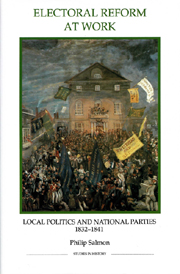Book contents
- Frontmatter
- Contents
- List of illustrations
- List of figures
- List of tables
- Dedication
- Acknowledgements
- Abbreviations
- Introduction
- PART I THE REFORMED ELECTORAL SYSTEM
- PART II THE COUNTIES
- PART III THE BOROUGHS
- Appendices
- 1 The re-distribution of English and Welsh seats in 1832
- 2 Voting qualifications after 1832
- 3 Registration and polling returns by borough and county, 1832–1839
- 4 The assimilation of English boroughs to the New Poor Law
- Bibliography
- Index
2 - Voting qualifications after 1832
from Appendices
Published online by Cambridge University Press: 12 September 2012
- Frontmatter
- Contents
- List of illustrations
- List of figures
- List of tables
- Dedication
- Acknowledgements
- Abbreviations
- Introduction
- PART I THE REFORMED ELECTORAL SYSTEM
- PART II THE COUNTIES
- PART III THE BOROUGHS
- Appendices
- 1 The re-distribution of English and Welsh seats in 1832
- 2 Voting qualifications after 1832
- 3 Registration and polling returns by borough and county, 1832–1839
- 4 The assimilation of English boroughs to the New Poor Law
- Bibliography
- Index
Summary
The county franchise
Unlike borough voters, county electors did not have to be resident (except where indicated below). Neither did they have to be assessed to the land tax or to have paid their taxes – a requirement which had been exacted intermittently in the century before 1832. Property had to have been held for at least six months before a man could register for the freehold or copyhold franchise and for at least twelve months in the case of leaseholders and occupiers, but any property which had been acquired by inheritance, marriage or promotion to a benefice or office was exempt from these conditions. Besides land, houses and buildings, there was a vast range of other types of property which might confer the vote, including tithes, rent charges, annuities and emoluments derived from land, mortgages, shares with an interest in the soil (such as shares in mines, rivers, gasworks and cemeteries), tolls of bridges or markets and purchases of redeemed land tax. In 1846 a select committee investigation discovered that there were 1,276 different types of electoral qualification in the counties, 576 for freehold, 400 for copyhold, 250 for leasehold and fifty for occupiers (PP 1846 (451) viii. 378).
- Type
- Chapter
- Information
- Electoral Reform at WorkLocal Politics and National Parties, 1832–1841, pp. 253 - 255Publisher: Boydell & BrewerPrint publication year: 2002



